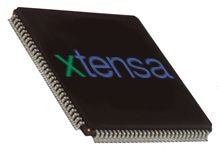Supported Processors
Xtensa Processor Architecture
The Xtensa processor architecture is a configurable, extensible, and synthesizable 32-bit RISC processor core. SoC and processor designers can select from a variety of options, such as instruction-set extensions, memory, cache, and interrupt configurations. Moreover, Xtensa's extensibility also allows to create custom-defined instructions, registers, ports, and queues. In any case, the underlying base Xtensa instruction set is not compromised, thereby ensuring compatibility of third party application software and development tools.
Tensilica’s Diamond Standard Series processor family consists of a number of ready-to-use synthesizable cores and is based on the Xtensa processor architecture. The Diamond 232L processor contains an MMU and was designed to run Linux.
Processor Configurations
Xtensa processors can come in a variety of configurations as defined by processor vendors. Although the strength of the Xtensa architecture is certainly the ability to optimize a processor for a particular application, many generic applications usually don't benefit much from these extensions. User-defined instructions optimized for audio decoding, for example, will probably not improve the performance of a web server much. Developers can, therefore, choose to use development tools configured for a generic processor configuration that provides binary-compatibility across various Xtensa processors to compile generic applications. LinuxBE (big-endian) and LinuxLE (little-endian) are such configurations. Based on the linux template provided to processor designers, they define a subset of options required to run Linux. Applications compiled with development tools for this configuration should, therefore, work on all Xtensa processors running Linux.
Development Toolchain
Although the Xtensa architecture provides seemingly unlimited combinations of processor configurations, modifications to create optimized development tools and kernels are limited to a small set of configuration files in the respective sources. Once the configuration files have been copied into the sources, the development tools can be configured and built as usual.
Kernel Configuration
Because the kernel is much closer to the hardware and provides an abstraction for many architectural options, it needs to be configured and compiled for a particular platform and processor configuration. If user-defined instruction are used, it also requires development tools configured for the particular processor. The following list shows processors currently supported by the kernel.
| Name | Byte order | Base configuration | Notes |
|---|---|---|---|
| 'FSF' | big endian | LinuxEB | Only for verification. |
| Diamond 232L | little/big endian | LinuxEB or LinuxEL | |
| Stretch S5000 | little endian | LinuxEL | |
| Custom | vendor specific | vendor specific | vendor specific |
All configuration files are located inside the Xtensa include directory in the kernel sources (include/asm-xtensa/variant-config). The custom entry in the table is a placeholder for custom-defined configurations provided by processor vendors. Developers should copy the configuration files into the custom variant directory (include/asm-xtensa/variant-custom) and select the custom processor during kernel configuration.
